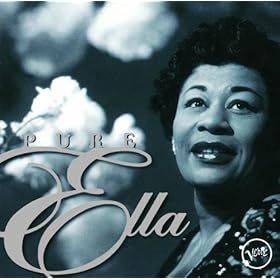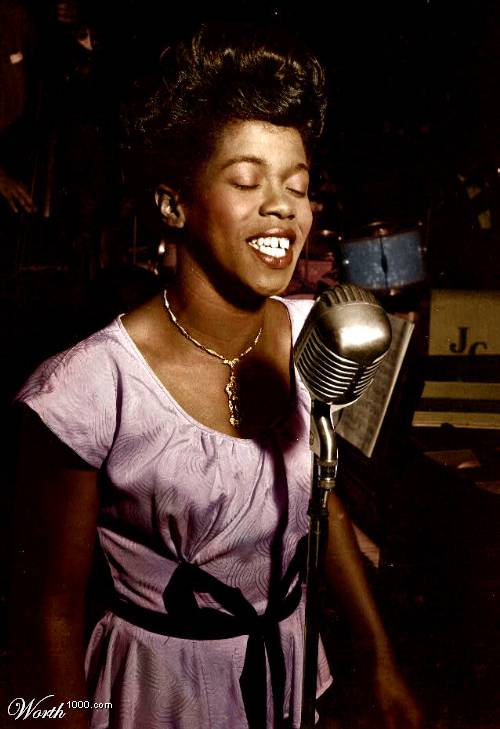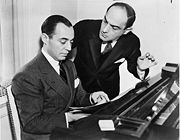Saint Valentine's Day (commonly shortened to Valentine's Day)[1][2][3] is an annual holiday held on February 14 celebrating love and affection between intimate companions.[1][3] The holiday is named after one or more early Christian martyrs named Valentine and was established by Pope Gelasius I in AD 496. It is traditionally a day on which lovers express their love for each other by presenting flowers, offering confectionery, and sending greeting cards (known as "valentines"). The holiday first became associated with romantic love in the circle of Geoffrey Chaucer in the High Middle Ages, when the tradition of courtly love flourished.
Modern Valentine's Day symbols include the heart-shaped outline, doves, and the figure of the winged Cupid. Since the 19th century, handwritten valentines have largely given way to mass-produced greeting cards.[4]
Source:
Rodgers and Hart were an American songwriting partnership of composer Richard Rodgers (1902 – 1979) and the lyricist Lorenz Hart (1895 – 1943). They worked together on 28 stage musicals and over 500 songs from 1919 until Hart's death in 1943.[1]
Richard Rodgers and Lorenz Hart were introduced in 1919, when both attended Columbia University,[2] when asked to write an amateur club show. After writing together for several years, they produced their first successful Broadway musical, The Garrick Gaieties, in 1925, which introduced their hit song, "Manhattan" and led to a series of successful musicals and films.[1] By the end of the 1920s they were among the most popular songwriters in America, but they turned to working in the movies with the advent of sound.[2] They wrote several popular songs for film during the mid-1930s, such as "Isn't It Romantic?" and "It's Easy to Remember", but they soon returned to Broadway with Billy Rose's Jumbo (1935).[2]
Many of their stage musicals from the late 1930s have been made into films, such as On Your Toes (1936) and Babes in Arms (1937). Pal Joey (1940), termed their "masterpiece",[2] has a book by The New Yorker writer John O'Hara. He adapted his own short stories featuring a title character, who is a heel. So unflinching was the portrait that critic Brooks Atkinson famously asked in his review "Although it is expertly done, how can you draw sweet water from a foul well?" When the show was revived in 1952, audiences had learned to accept and enjoy darker material on Broadway (thanks in large part to Rodgers' work with Oscar Hammerstein). The new production ran considerably longer than the original and was called a masterpiece and a classic by reviewers. Atkinson, reviewing the revival, wrote that "it renews confidence in the professionalism of the theatre."[3]
[edit] Analysis
Time Magazine devoted a cover story to Rodgers and Hart (September 26, 1938). They wrote that their success "rests on a commercial instinct that most of their rivals have apparently ignored". The article also noted the "spirit of adventure." "As Rodgers and Hart see it, what was killing musicomedy [sic] was its sameness, its tameness, its eternal rhyming of June with moon."[4]
Their songs have long been favorites of cabaret singers and jazz artists. For example, Ella Fitzgerald recorded their songbook. Andrea Marcovicci based one of her cabaret acts entirely on Rodgers and Hart songs.[5]
Hart's lyrics, facile, vernacular, dazzling, sometimes playful, sometimes melancholic, raised the standard for Broadway songwriting. "His ability to write cleverly and to come up with unexpected, polysyllabic rhymes was something of a trademark, but he also had the even rarer ability to write with utmost simplicity and deep emotion."[6] Rodgers, as a creator of melodies, ranks with Jerome Kern and Irving Berlin.
Their shows belong to the era when musicals were revue-like and librettos were not much more than excuses for comic turns and music cues. Still, just as their songs were a cut above, so did the team try to raise the standard of the musical form in general. Thus, A Connecticut Yankee (1927) was based on Mark Twain's novel, and The Boys From Syracuse (1938) on William Shakespeare's The Comedy of Errors. "They had always considered the integration of story and music a crucial factor in a successful show." They used dance significantly in their work, using the ballets of George Balanchine.[7]
Source:
http://en.wikipedia.org/w/index.php?title=Special%3ASearch&search=rogers+and+hart&go=Go
My Funny Valentine

Babes in Arms opened at the Shubert Theatre on Broadway, in New York, New York on April 14, 1937 and ran for 289 performances.[1] In the original play, a character named Billie Smith (played by Mitzi Green) sings the song to Valentine "Val" LaMar (played by Ray Heatherton).[2] In the song, Billie pokes fun at some of Valentine's characteristics, but ultimately affirms that he makes her smile and that she doesn't want him to change. The song first hit the charts in 1945, performed by Hal McIntyre with vocals by Ruth Gaylor.[3] It only appeared for one week and hit #16.[4]
[edit] Notable recordings
The song is considered part of the Great American Songbook and has had many notable recordings. Five of these are considered to be definitive:
- (1952) Chet Baker had a hit with Gerry Mulligan
- (1955) Frank Sinatra included it on his album Songs for Young Lovers, and it became a performance favorite.
- (1956) Ella Fitzgerald sang it on her album Ella Fitzgerald Sings the Rodgers & Hart Songbook.
- (1956) Jimmy Giuffre included it on his album The Jimmy Giuffre Clarinet.
- (1958) The Miles Davis Sextet recorded song on their album '58 Miles, demonstrating the unique modal approach of Davis and pianist Bill Evans;
 |
his virtue doth parade,
thou knowest not, my dim-witted friend
the picture thou hast made,
Thy vacant brow, and thy tousled hair
conceal thy good intent
thou noble upright truthful sincere,
and slightly dopey gent.
My funny Valentine, sweet comic Valentine,
you make me smile with my heart.
Your looks are laughable, unphotographable.
Yet, you´re my fav´rite work of art.
Is your figure less than Greek ?
Is your mouth a little weak ?
When you open it to speak, are you smart ?
But don´t change on hair for me, not if you care for me.
Stay little Valentine, stay !
Each day is Valentine´s day.
Is your figure less than Greek ? Is your mouth a little weak ?
When you open it to speak, are you smart ?
But please, don´t change on hair for me, not if you care for me.
Stay little Valentine, stay !
Each day is Valentine´s day.
Click These Links and Sing Along:

Dolores Gray sings My Funny Valentine (vaimusic.com) Bell Telephone Hour, 1959





--
Together, we can change the world, one mind at a time.
Have a great day,
Tommy
__._,_.___



No comments:
Post a Comment